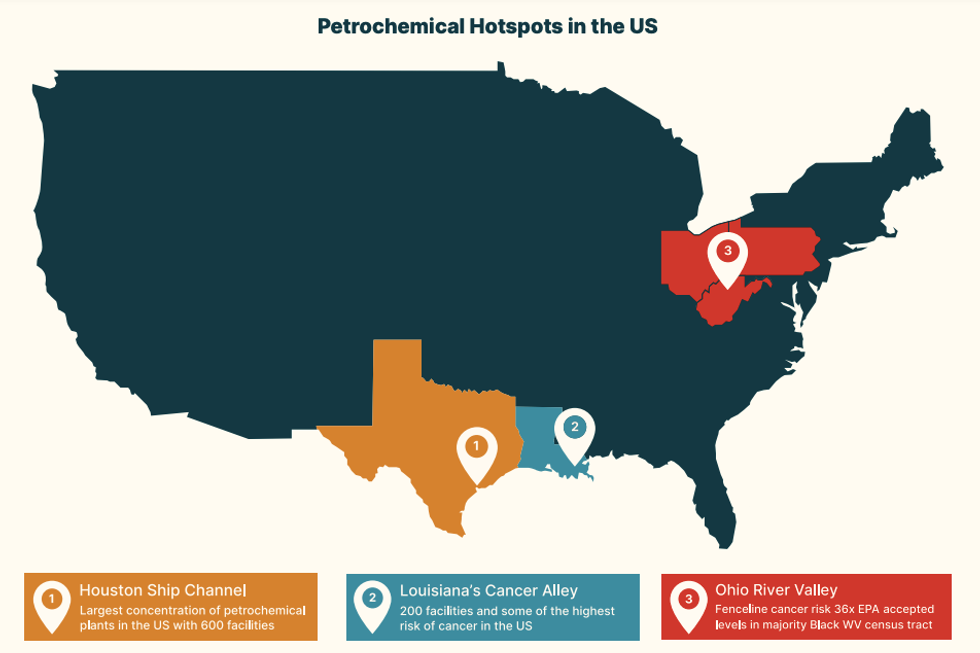Environmental and policy groups on Tuesday called for financial institutions to stop funding the U.S. petrochemical industry.
Break Free from Plastic, Friends of the Earth, the Center for International Environmental Law (CIEL), and the Texas Campaign for the Environment issued a 39-page report, Exiting Petrochemicals, that they called a "guide" for financial institutions to divest from the industry.
Petrochemicals are made from fossil fuels and are the basis for a wide array of industrial feedstocks and end products, mostly in plastics or fertilizers. The products drive climate change and harm public health throughout their life cycle, from the frontline communities—disproportionately marginalized and low-income—where fuels are extracted to the oceans and human bodies where microplastics, for example, end up.
The report calls for financial institutions—banks, investment firms, and insurance companies—to stop funding fracking, rapidly phase out all fossil fuel financing, and require petrochemical clients to publicly release transition plans. It also calls for an immediate halt on the financing of new petrochemical projects, about 120 of which are currently planned in the U.S., mostly in the Gulf and the Ohio River Valley.
"The communities most impacted by these developments, often low-income and communities of color, bear the brunt of pollution and health risks," Sharon Lavigne, executive director of RISE St. James, a campaign group in Louisiana, said in a statement.
"We must hold financial institutions accountable for their role in financing these harmful projects," Lavigne added. "It's time to stop funding environmental racism and start investing in a cleaner, safer future for everyone."
Diane Wilson, the executive director of the San Antonio Bay Estuarine Waterkeeper and a fourth-generation fisher, said the industry had already had a negative impact on her area.
"Given the terrible damage that I have seen corporations like Formosa Plastics do to communities, workers, fisheries, bays, and fishermen, the line has to be drawn: No more funding for plastics and petrochemicals!" she said.
Brandon Marks, a CIEL campaigner, summarized the problems the report seeks to address: "The petrochemical industry and its toxic products pose an urgent threat to human health and the global climate."
 Source: "Exiting Petrochemicals" report (2024)
Source: "Exiting Petrochemicals" report (2024)
Primary plastics production accounted for 5.3% of global greenhouse gas emissions as of 2019—more than commercial aviation and international shipping combined, according to the report.
Fertilizers are also a major emissions source, especially those used in cornfields. Synthetic nitrogen fertilizers derived from fossil fuels account for an estimated 2-5% of total global emissions.
In total, the U.S. petrochemical industry alone releases roughly the emissions equivalent of 40 coal-fired power plants every year, the report says.
The climate impact, however, is only part of the problem, as the report details.
"Petrochemical production releases carcinogenic and other highly toxic substances into the air, exposing fenceline communities to higher risks of cancer, leukemia, reproductive and developmental problems, nervous system impairment, and genetic impacts," the authors wrote in the executive summary.
"Petrochemical production also pollutes waterways with contaminated wastewater," they continued. "In fact, Formosa Plastics was fined $50 million in 2019 for illegally discharging plastic pollution into Texas waterways and another $19.2 million as of June 2024 for continuing violations."
Fossil fertilizers also pose major risks, endangering farmworkers, polluting drinking water, and causing dead zones in marine environments like the Gulf of Mexico, the report says.
Two-thirds of the people living on the fenceline of petrochemical projects are from marginalized racial backgrounds, making these groups disproportionately represented—they make up only 39% of the U.S. population, according to the report.
The authors also put forth the business case against financing the petrochemical industry, arguing that new regulations and decreased demand will make petrochemical plants stranded assets.
"Choosing to finance and insure these projects is not just irresponsible; it's a poor investment," Marks of CIEL said. "Banks, insurers, and investors must stop financing petrochemicals now."

 Source: "Exiting Petrochemicals" report (2024)
Source: "Exiting Petrochemicals" report (2024)